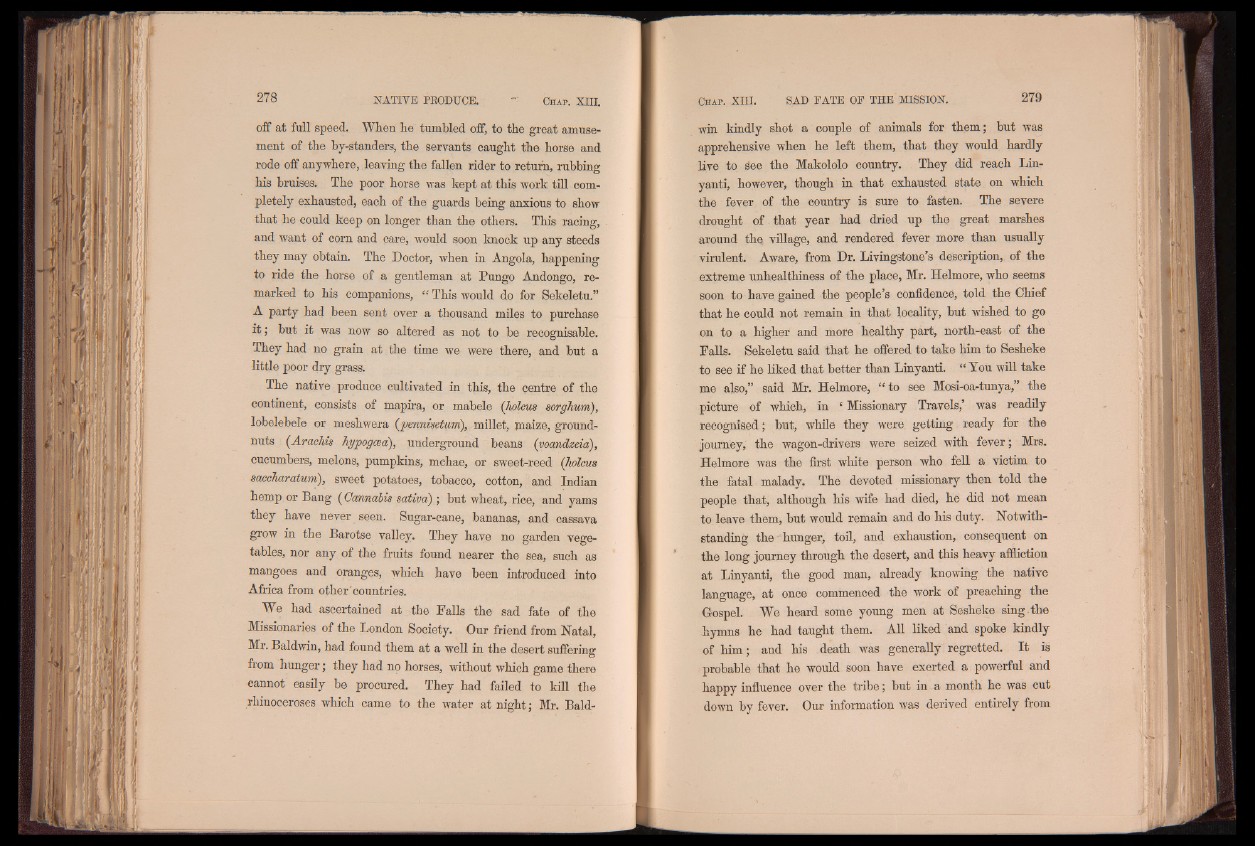
off at full speed. When he tumbled off, to the great amusement
of the by-standers, the servants caught the horse and
rode off anywhere, leaving the fallen rider to return, rubbing
his bruises. The poor horse was kept at this work till completely
exhausted, each of the guards being anxious to show
that he could keep on longer than the others. This racing,
and want of corn and care, would soon knock up any steeds
they may obtain. The Doctor, when in Angola, happening
to ride the horse of a gentleman at Pungo Andongo, remarked
to his companions, “ This would do for Sekeletu.”
A party had been sent over a thousand miles to purchase
i t ; but it was now so altered as not to be recognisable.
They had no grain at the time we were there, and but a
little poor dry grass.
The native produce cultivated in this, the centre of the
continent, consists of mapira, or mabele (holcus sorghum),
lobelebele or meshwera (pennisetum), millet, maize, groundnuts
(Arachis hypogcea), underground beans (voandzda),
cucumbers, melons, pumpkins, mchae, or sweet-reed (holcus
saccharatum), sweet potatoes, tobacco, cotton, and Indian
hemp or Bang (Cannabis sativa) ; but wheat, rice, and yams
they have never seen. Sugar-cane, bananas, and cassava
grow in the Barotse valley. They have no garden vegetables,
nor any of the fruits found nearer the sea, such as
mangoes and oranges, which have been introduced into
Africa from other'countries.
We had ascertained at the Falls the sad fate of the
Missionaries of the London Society. Our friend from Natal,
Mr. Baldwin, had found them at a well in the desert suffering
from hunger; they had no horses, without which game there
cannot easily be procured. They had failed to kill the
rhinoceroses which came to the water at night; Mr. Baldwin
kindly shot a couple of animals for them; but was
apprehensive when he left them, that they would hardly
live to see the Makololo country. They did reach Lin-
yanti, however, though in that exhausted state on which
the fever of the country is sure to fasten. The severe
drought of that year had dried up the great marshes
around the village, and rendered fever more than usually
virulent. Aware, from Dr. Livingstone’s description, of the
extreme unhealthiness of the place, Mr. Helmore, who seems
soon to have gained the people’s confidence, told the Chief
that he could not remain in that locality, but wished to go
on to a higher and more healthy part, north-east of the
Falls. Sekeletu said that he offered to take him to Sesheke
to see if he liked that better than Linyanti. “ You will take
me also,” said Mr. Helmore, “ to see Mosi-oa-tunya,” the
picture of which, in ‘ Missionary Travels,’ was readily
recognised; but, while they were getting ready for the
journey, the wagon-drivers were seized with fever; Mrs.
Helmore was the first white person who fell a victim to
the fatal malady. The devoted missionary then told the
people that, although his wife had died, he did not mean
to leave them, but would remain and do his duty. Notwithstanding
the hunger, toil, and exhaustion, consequent on
the long journey through the desert, and this heavy affliction
at Linyanti, the good man, already knowing the native
language, at once commenced the work of preaching the
Gospel. We heard some young men at Sesheke sing , the
hymns he had taught them. All liked and spoke kindly
of h im ; and his death was generally regretted. I t is
probable that he would soon have exerted a powerful and
happy influence over the tribe; but in a month he was cut
down by fever. Our information was derived entirely from